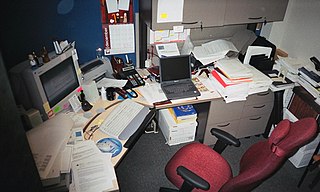- Accessible stylesheet enabled! Contrast and font sizes have been increased.
Do We Really Need Offices?
August 7th, 2013 by Dexter Findley
The Office is something of an institution in our society. Romanticized during the first half of the 20th century, and a constant fact of life since then, it has the honor of being dubbed the West's 'second (social) space' after the home. Not only a repository for a company's data, personnel and materials; it was also a badge of pride, a legitimization, a way of showing off.
Nowadays, with the internet facilitating distance document collaboration and file-sharing as well as simple telecommunications, the role of the office as a workspace has diminished. The 'space' aspect has gone digital, to the so-called 'cloud' (in reality a remote server accessible anywhere with a net connection), meaning that co-workers no longer have to be in the same physical area to work on projects together. What's left is data storage (also rapidly heading to the cloud, or at least to portable digital formats), materials storage and the social aspects.
Office space can be a considerable outlay for companies. Rent doesn't come cheap, and it's an expenditure that doesn't really see a return (unless a physical location is the basis for whatever your company sells). Nowadays, since not having an office isn't the stigma (both logistically and socially) it used to be, more and more small companies are switching to distance working, co-working or something else entirely.
Let's evaluate the options. First, distance working, otherwise known as Working From Home. It has advantages, mainly the massive flexibility if affords and the lack of any 'effort' needed in dress etc, but its lack of structure can have drawbacks. Sometimes, having the social space of an office is good for personal and company morale, and preserves the distinction between the spheres of 'work' and 'life' (if you want to make such a separation, that is).
Then, co-working. This is part of a grey area tentatively called the Third Space, a Space that is separate from Home Environments and Offices Spaces, but in reality encapsulates a mixture of both and a bit of neither. Co-working, while categorized such, is in reality much closer to Office than it is Home. The principle is that multiple small companies, organisations, freelancers and the like share a single work area: it is usually less regimented than a traditional office, with hot-desking, hip vibes and trendy locations usually being the norm. It will still cost something (less than offices, but a London co-working space could probably pay for dedicated office space in other parts of the country), but it comes with the added flexibility of having zero bureaucracy (contracts, bills, insurance and so on) and flexible start-stop dates.
The rest of the Third Space is very difficult to define, mainly because its definition is exclusive rather than inclusive (anything that isn't home or office), so anything goes, really. Member Clubs, libraries, universities, cafés with WiFi, pubs with WiFi... anywhere with WiFi. There aren't really any advantages or disadvantages one can apply to any of these - it's entirely dependent on the individual's preference and current mood.
All in all, the landscape of Working Life is changing, becoming less rigid and clearly defined. This follows the wider socio-economic trends of Britain moving towards a 'knowledge economy' and the proliferation of net technologies and accessibility, which begs the question: has the office had its day?
- Peace Of Mind
- Reference Checked... ✔
- Identity Verified... ✔
- Client Reviewed... ✔
- 7 Day Support... ✔